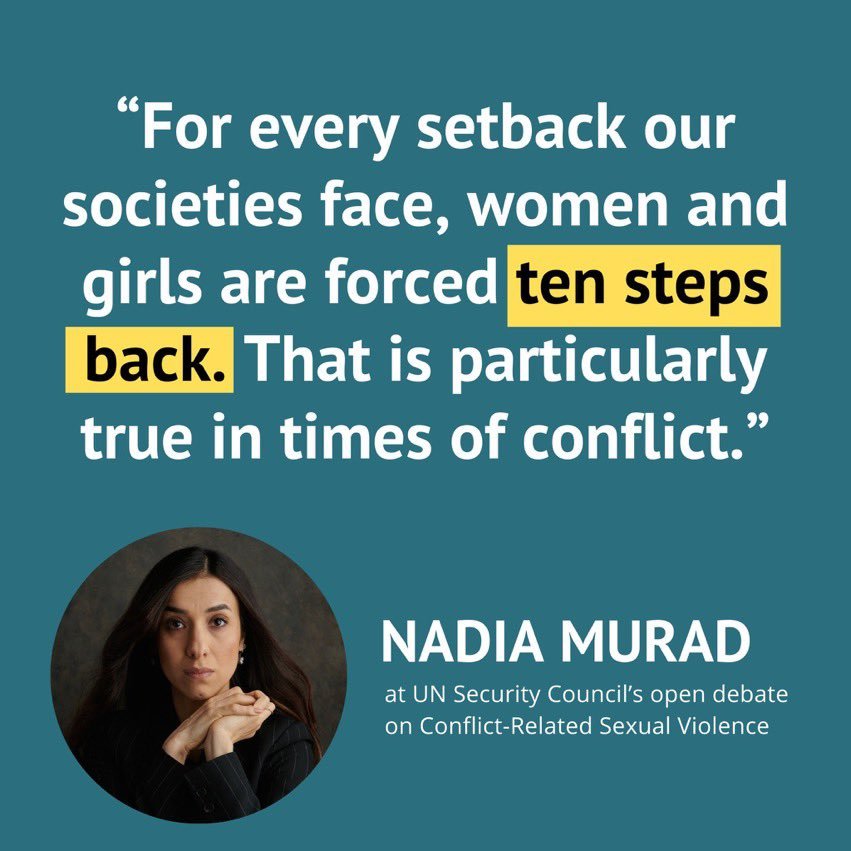NEW YORK, APRIL 13 – The 2018 Nobel Peace Prize winner Nadia Murad and the Permanent Mission of the United Kingdom presented today to United Nations a global code of conduct to address sexual assaults in conflicts, such as those in Afghanistan and Ukraine, or in crises in Africa. The so called “Murad Code”, after the the young woman of the Yazidi minority imprisoned in Iraq and enslaved by ISIS, which has devoted years of efforts to seeking justice for surviving victims, facilitating the access to evidence.
 “Efforts to end sexual violence are gaining momentum, largely thanks to the brave survivors around the world who shared their stories,” said Murad, who attended the annual Security Council meeting on this subject. “Too often, however, reporting sexual violence has negative consequences for survivors. The ‘Murad Code’ establishes clear and practical guidelines to focus on their needs during the collection of evidence and ensure that they receive justice and support, not retributions”.
“Efforts to end sexual violence are gaining momentum, largely thanks to the brave survivors around the world who shared their stories,” said Murad, who attended the annual Security Council meeting on this subject. “Too often, however, reporting sexual violence has negative consequences for survivors. The ‘Murad Code’ establishes clear and practical guidelines to focus on their needs during the collection of evidence and ensure that they receive justice and support, not retributions”.
The Italian Permanent Representative to the UN, Maurizio Massari, took the opportunity of the open debate to reiterate Italy’s “firm condemnation” of the “unjustified aggression” of Russia and its commitment for the protection and promotion of the rights of women and girls, “rooted in time and among the pillars of Italian action at the United Nations”, and for the fight against all forms of sexual and gender violence, both in times of peace and war.
“We are deeply concerned by the repeated attacks on civilians, including women and children, and by the testimonies and reports of conflict-related sexual violence against women and girls, including rapes, perpetrated by the Russian armed forces”, said Massari. He also highlighted how state and non-state actors still resort to sexual violence as a tactic of war, torture and terrorism, as shown in the latest report of the UN Secretary General. “Conflict-related sexual and gender-based violence, including rapes, are heinous violations of human rights and war crimes”, the Ambassador continued, outlining five priorities of Italy: the prevention of sexual violence starting from peaceful times, adopting rules at national level that are strong enough to prevent abuses and violations in times of war; initiating a strong paradigm shift in defence of the culture of gender equality, to promote the emancipation of women and their full, fair and effective participation in decision-making processes; in line with Security Council Resolution 2467, developing approaches that focus on survivors in order to prioritise the rights and needs of victims; put pressure on the civil protection role of UN peacekeeping missions (in which Italy has promoted a stronger presence of women); fight impunity and ensure that perpetrators of conflict-related sexual violence are accountable for their crimes.
“To this end – said Massari – we need to assist conflict-torn Countries and guide them in reforming their judicial systems by strengthening the rule of law and their accountability mechanisms”. (@OnuItalia)

